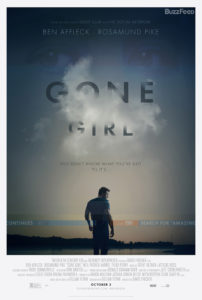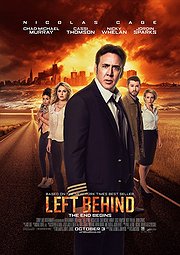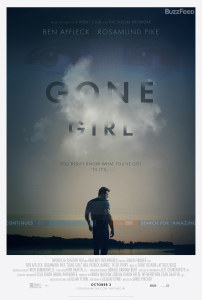Stories And Human Nature
 The top box office movies this past weekend were Gone Girl and Annabelle. Left Behind came in a distant sixth.
The top box office movies this past weekend were Gone Girl and Annabelle. Left Behind came in a distant sixth.
Gone Girl, in the number one spot, is an adaptation from the novel by the same title. The story is a thriller/mystery about a wife who goes missing. The thing I found most interesting as I looked for reactions and reviews is that readers of the book said they didn’t like any of the characters. Oh, they loved the story and at first they felt sorry for the husband, but by the end, they didn’t like anyone.
Movie critics had things like this to say: “Fincher [the author and the screenwriter] has designed a portrait of marriage as psychological warfare where ceasefires masquerade as happiness” (Laura Clifford, Reeling Reviews).
 Annabelle, a supernatural horror spinoff of The Conjuring, may have had characters that were likeable, but in the end the point of the movie, as stated by Lorraine Warren, co-owner of the museum which houses the real Annabelle doll, is this: “Evil is real, and while we can contain it, we can never get rid of it.”
Annabelle, a supernatural horror spinoff of The Conjuring, may have had characters that were likeable, but in the end the point of the movie, as stated by Lorraine Warren, co-owner of the museum which houses the real Annabelle doll, is this: “Evil is real, and while we can contain it, we can never get rid of it.”
Left Behind, the third new release that finished in the top ten in the weekend box office numbers, is an apocalyptic thriller. This story depicts, through the perspective of three main characters, the effects on society of the (pre-tribulation) rapture—the removal of Christ’s Church from earth when believers meet Jesus in the air prior to the tribulation prophesied in Scripture.
Critical acclaim seems to be all in the Gone Girls court which received an 87% fresh score from Rotten Tomatoes. In contrast, Annabelle came in with a score of 32%, and Left Behind, an embarrassing 2%. On the other hand, the latter fared better in the audience score than did Annabel (60% liked it compared to 51%), though Gone Girl bested them both by a wide margin (92% of the audience liked it).
 As an aside, what critics say about a book or movie isn’t always reflective of the quality. One Left Behind critic, for example, found the movie problematic because it was “Bargain-basement Evangelical stuff” with a devout Muslim left behind, which means it “belongs in a church basement, not a movie theater.” Another reviewer who identifies himself as a Christian didn’t like the movie at all but didn’t give much of an explanation. He thought the special effects were bad (it is low budget), and it really bugged him that the Nicholas Cage character, Rayford Steele, didn’t carry a flight bag. Or that the phones stopped working right away. But mostly that no one knew why there were disappearances—after all, the idea of the rapture is well known (now!)
As an aside, what critics say about a book or movie isn’t always reflective of the quality. One Left Behind critic, for example, found the movie problematic because it was “Bargain-basement Evangelical stuff” with a devout Muslim left behind, which means it “belongs in a church basement, not a movie theater.” Another reviewer who identifies himself as a Christian didn’t like the movie at all but didn’t give much of an explanation. He thought the special effects were bad (it is low budget), and it really bugged him that the Nicholas Cage character, Rayford Steele, didn’t carry a flight bag. Or that the phones stopped working right away. But mostly that no one knew why there were disappearances—after all, the idea of the rapture is well known (now!)
But my point here is not to give a rah-rah plug for Left Behind. After all, I haven’t seen the movie and only read the beginning of the first book. It may be as bad as the critics say.
What I find fascinating about these three movies is the theme that runs through them—unlikeable characters depicting marriage as psychological warfare; evil is real and we can’t get rid of it; and “good” removed leaves evil to fend for—and against—itself.
I think it’s safe to say, these are not feel-good movies. No happy endings here. Only more doom or disaster waiting around the corner.
I suppose, in part, it’s the job of October movies to generate this kind of “hold your breath and duck” sensation. Nothing is safe. A “good” marriage might be the greatest battleground. Even the most innocent-appearing doll may be your worst nightmare. A routine trans-Atlantic flight can turn into a disaster of epic proportions.
In all three the characters seem to share a victim-perpetrator mixture. They suffer, but at least in part, their suffering is self-induced though inflicted from the outside.
These kinds of movies don’t seem to fit what perhaps a majority of people say they believe—that humankind is evolving to a place that is better. In other words, there seems to be a divide between what the latest stories have to say about life and what the majority of people contend they believe.
In contrast, the Star Trek franchise showed what they believed. The Federation had embraced peace. Standing armies were no longer needed. Star ships went on scientific explorations, not military conquests. No one made a power grab unless controlled in some way by an alien species. All sentient life was respected (even that which was as small as a grain of sand). In the end, the great antagonist, the Borg, proved to be a form of technology gone awry, assimilating everything in their [its?] path.
The three new movies would seem to be more in touch with reality than stories like the various Star Trek threads—evil is here to stay and evil extends right into the heart of those closest to us, even into our own hearts.
Only Left Behind, however, is true to its worldview. Essentially, as I understand it, the story proposes what the world would look like if Christ removed all the Christians—a premise consistent with believing that there are saved and there are lost, that knowing Christ is the dividing line.
So what, I wonder is the driving force behind movies like Gone Girl and Annabelle and even Left Behind?
In his post today at Decompose, author Mike Duran looks at dystopian fiction asking essentially the same question about that popular genre. He concludes that
The genre of dystopian books and films reinforces a vital biblical theme — Man is broken. No amount of moral or technological “tweaks” can correct the malfunction that is Us.
In a way, our embrace of dystopia is both a rejection of utopia and the notion of inherent human goodness. History and personal experience have shown us, over and over again, that when left to his devices Man fails. No amount of drugs, diplomacy, technology, education, or entertainment can prevent collapse, both internal and external. Dystopia is an admission of depravity. We are the anti-Midas: Everything we touch rots. And the bigger our contribution, the more pervasive the decomposition. (Emphases in the original).
A vital Biblical theme, yes, but not one that’s consistent with the contemporary worldview which seems to favor educating and legislating in order to find utopia.
And yet, our stories aren’t about finding utopia. They’re about trying to survive or escape the hellish dystopian society that seems inevitable. So I’m wondering why the worldview we espouse as a society doesn’t measure up with the one we show in our stories.
But, of course, these three new movies may not be trending except for the fact that they are good for October and fall scariness. However I tend to agree with Mike Duran.
I think, despite our protestations to the contrary, most people recognize the downward spiral we’re on, but simply don’t want to admit it. We don’t want to say we believe the world is getting more corrupt. We want to believe that if we’re just more tolerant, prejudice will go away; or if we reduce our human footprint, we can fix climate change; or if we treat other peoples with respect, we can bring an end to war. We want to believe we are God, with all His capacity to fix the mess we’re in.
But despite our stated beliefs, our stories seem to tell a different tale. And I find that discrepancy interesting.









































It’s actually worse.
The books are. But the movie’s “worldview” — even using the word seems to connote respect for the movie as having any “view” — makes no sense even internally.
Sneak preview: